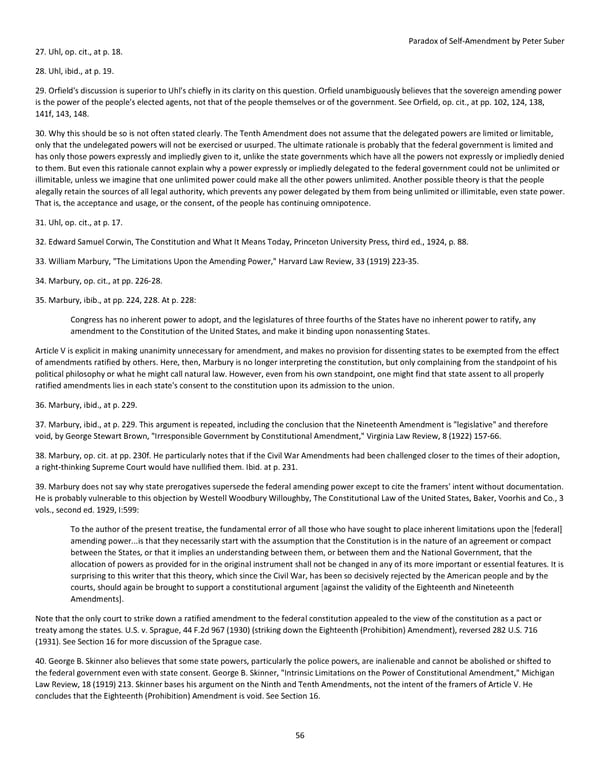Paradox of Self-Amendment by Peter Suber 27. Uhl, op. cit., at p. 18. 28. Uhl, ibid., at p. 19. 29. Orfield's discussion is superior to Uhl's chiefly in its clarity on this question. Orfield unambiguously believes that the sovereign amending power is the power of the people's elected agents, not that of the people themselves or of the government. See Orfield, op. cit., at pp. 102, 124, 138, 141f, 143, 148. 30. Why this should be so is not often stated clearly. The Tenth Amendment does not assume that the delegated powers are limited or limitable, only that the undelegated powers will not be exercised or usurped. The ultimate rationale is probably that the federal government is limited and has only those powers expressly and impliedly given to it, unlike the state governments which have all the powers not expressly or impliedly denied to them. But even this rationale cannot explain why a power expressly or impliedly delegated to the federal government could not be unlimited or illimitable, unless we imagine that one unlimited power could make all the other powers unlimited. Another possible theory is that the people alegally retain the sources of all legal authority, which prevents any power delegated by them from being unlimited or illimitable, even state power. That is, the acceptance and usage, or the consent, of the people has continuing omnipotence. 31. Uhl, op. cit., at p. 17. 32. Edward Samuel Corwin, The Constitution and What It Means Today, Princeton University Press, third ed., 1924, p. 88. 33. William Marbury, "The Limitations Upon the Amending Power," Harvard Law Review, 33 (1919) 223-35. 34. Marbury, op. cit., at pp. 226-28. 35. Marbury, ibib., at pp. 224, 228. At p. 228: Congress has no inherent power to adopt, and the legislatures of three fourths of the States have no inherent power to ratify, any amendment to the Constitution of the United States, and make it binding upon nonassenting States. Article V is explicit in making unanimity unnecessary for amendment, and makes no provision for dissenting states to be exempted from the effect of amendments ratified by others. Here, then, Marbury is no longer interpreting the constitution, but only complaining from the standpoint of his political philosophy or what he might call natural law. However, even from his own standpoint, one might find that state assent to all properly ratified amendments lies in each state's consent to the constitution upon its admission to the union. 36. Marbury, ibid., at p. 229. 37. Marbury, ibid., at p. 229. This argument is repeated, including the conclusion that the Nineteenth Amendment is "legislative" and therefore void, by George Stewart Brown, "Irresponsible Government by Constitutional Amendment," Virginia Law Review, 8 (1922) 157-66. 38. Marbury, op. cit. at pp. 230f. He particularly notes that if the Civil War Amendments had been challenged closer to the times of their adoption, a right-thinking Supreme Court would have nullified them. Ibid. at p. 231. 39. Marbury does not say why state prerogatives supersede the federal amending power except to cite the framers' intent without documentation. He is probably vulnerable to this objection by Westell Woodbury Willoughby, The Constitutional Law of the United States, Baker, Voorhis and Co., 3 vols., second ed. 1929, I:599: To the author of the present treatise, the fundamental error of all those who have sought to place inherent limitations upon the [federal] amending power...is that they necessarily start with the assumption that the Constitution is in the nature of an agreement or compact between the States, or that it implies an understanding between them, or between them and the National Government, that the allocation of powers as provided for in the original instrument shall not be changed in any of its more important or essential features. It is surprising to this writer that this theory, which since the Civil War, has been so decisively rejected by the American people and by the courts, should again be brought to support a constitutional argument [against the validity of the Eighteenth and Nineteenth Amendments]. Note that the only court to strike down a ratified amendment to the federal constitution appealed to the view of the constitution as a pact or treaty among the states. U.S. v. Sprague, 44 F.2d 967 (1930) (striking down the Eighteenth (Prohibition) Amendment), reversed 282 U.S. 716 (1931). See Section 16 for more discussion of the Sprague case. 40. George B. Skinner also believes that some state powers, particularly the police powers, are inalienable and cannot be abolished or shifted to the federal government even with state consent. George B. Skinner, "Intrinsic Limitations on the Power of Constitutional Amendment," Michigan Law Review, 18 (1919) 213. Skinner bases his argument on the Ninth and Tenth Amendments, not the intent of the framers of Article V. He concludes that the Eighteenth (Prohibition) Amendment is void. See Section 16. 56
 The Paradox of Self-Amendment Page 75 Page 77
The Paradox of Self-Amendment Page 75 Page 77